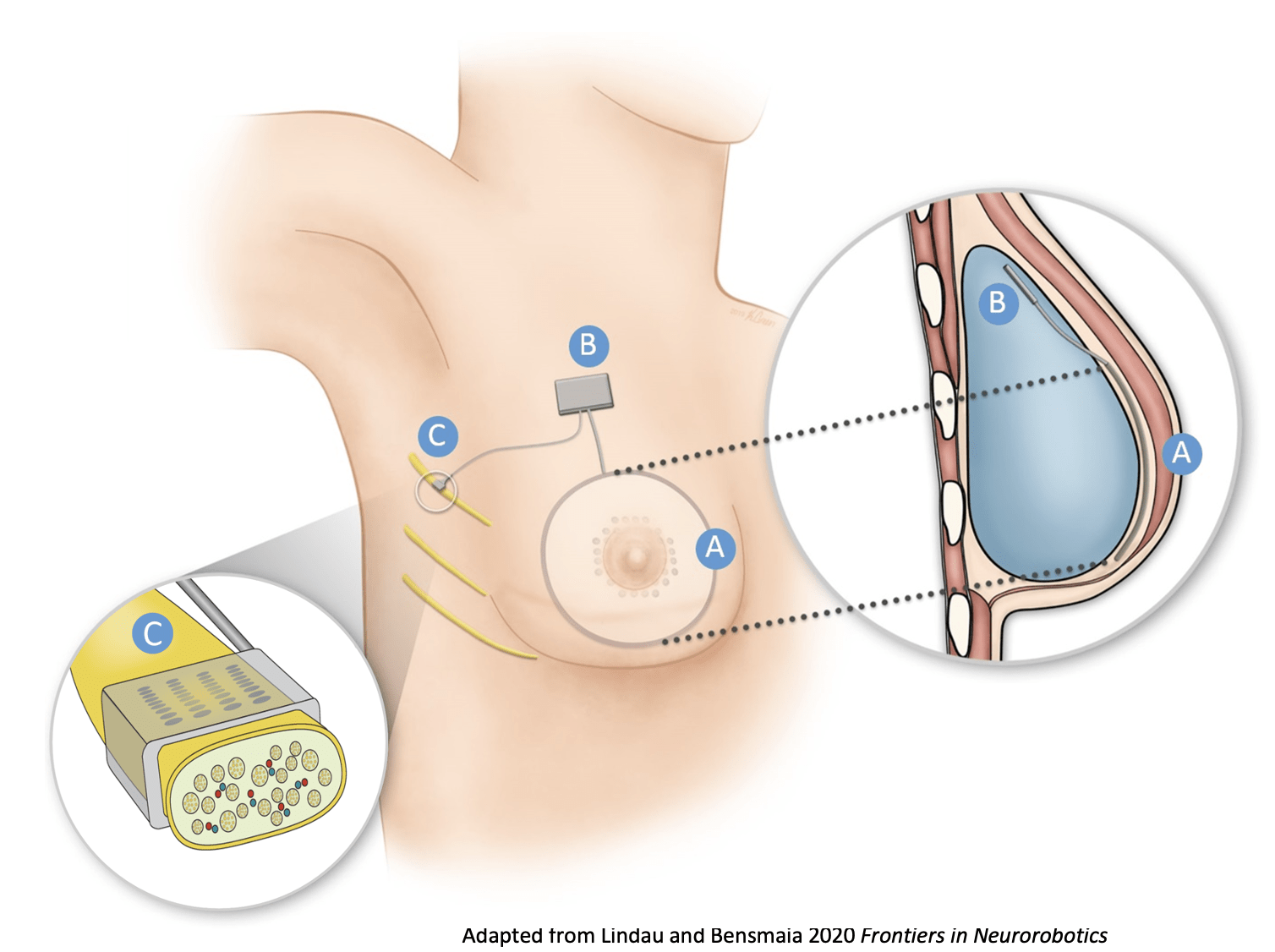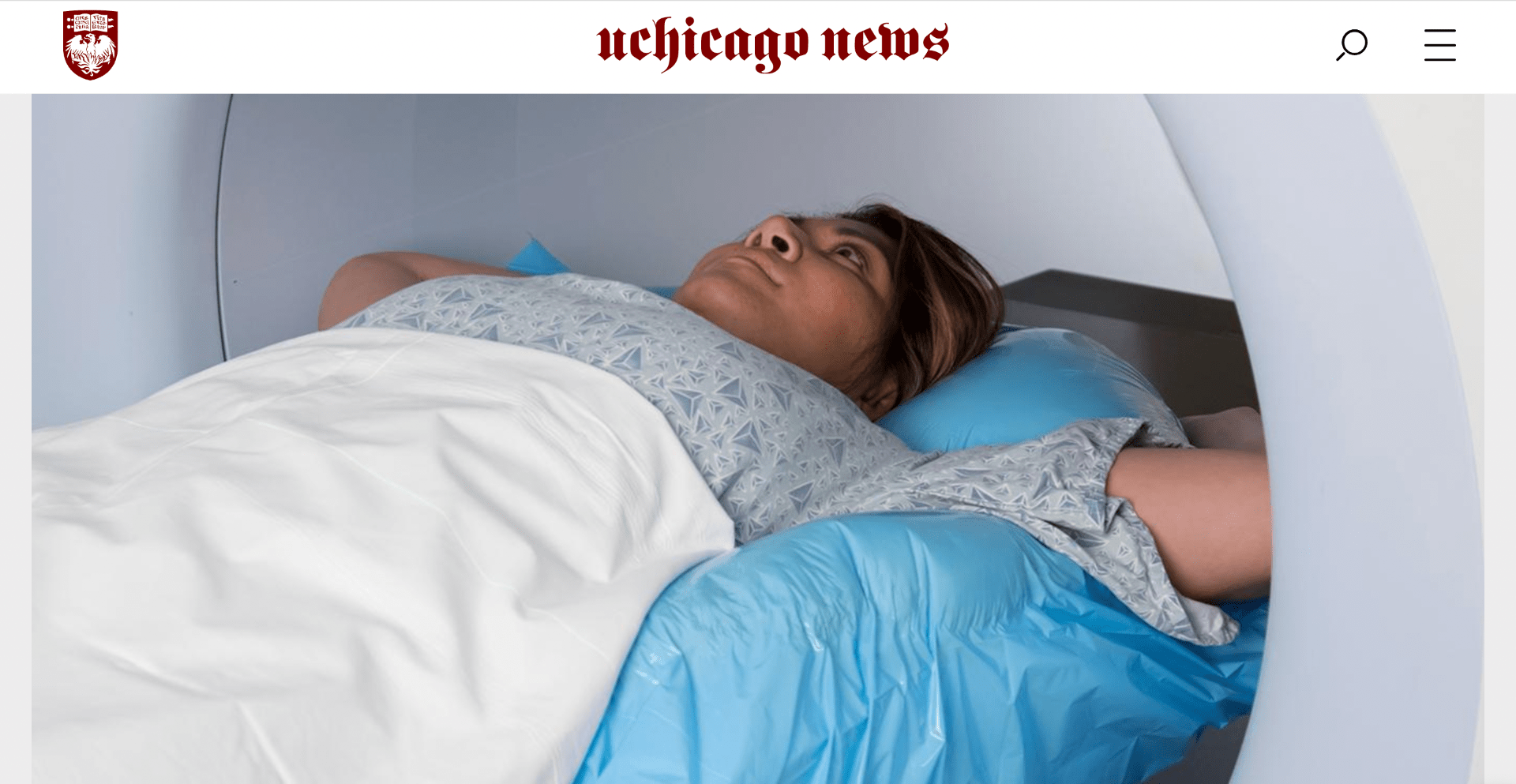Bionic Breast
“… [W]e want sensation, and we deserve it. We want sensation in our breast because we want to feel sexual again, and we deserve it.”
“[The breasts] play directly into sexual stimulation and sexual function. There was, I mean, honestly there was a direct line from my nipples right to my clitoris, right in there and it’s gone. It was taken.”

Of more than 3.8 million female breast cancer survivors in the United States today, about a third have undergone mastectomy and hundreds of thousands have had breast reconstruction procedures. More than 100,000 women have one or both breasts removed each year. Simple mastectomy amputates all of the breast tissue, including the third through sixth intercostal nerves, leaving the breast numb. The resulting deafferentation leads to major adverse effects, including a disembodiment of the breasts, loss of touch-based affective communication, abolition of breast-centered erogenous touch, and, in many women, the development of chronic pain.
Our objective is to improve our understanding of female breast sensory function and develop a neuroprosthetic solution to the negative sensory sequelae of mastectomy using bionics. The Bionic Breast is an implantable, neuroprosthetic medical device that applies a combination of pressure sensor activation through implanted peripheral nerve electrodes and electrical stimulation to residual nerves to restore sensation and reduce chronic pain following mastectomy.
Forbes 50 Over 50 and NBC News feature Bionic Breast Project
Forbes 50 Over 50 has recognized Dr. Stacy Tessler Lindau and the Bionic Breast Project in leading technological innovation for the betterment of society.
Read the Forbes article here
Watch Dr. Lindau’s interview with NBC News here

Current Projects

Towards Restoring Breast Sensory Function in Women with Mastectomy
Funded by: Janet D. Rowley Discovery Fund at the University of Chicago
Funding Period: April 2018 – March 2019
Principal Investigator: Stacy Tessler Lindau, MD, MAPP
Public Health Relevance
Loss of breast sensation among women who have undergone reconstruction after mastectomy for breast cancer is a common, distressing outcome affecting a growing population of cancer survivors. In spite of surgical innovations that restore breast form, the failure to restore breast sensory function after mastectomy may explain high rates of sexual dysfunction among female breast cancer survivors. The goal of this research is to improve our understanding of female breast sensory function and its relationship to sexual function and to lay the foundation for a solution to preserve and/or restore breast function following mastectomy.
Aims
1. Develop and validate a self-report measure of breast sensory function and examine the link between breast sensory function and sexual function in affected and unaffected women
2. Characterize breast sensation, examine its modulation by arousal, and establish its neural substrates using state-of-the-art psychophysical techniques

A Neuroprosthesis to Restore Touch Sensation and Reduce Chronic Pain After Mastectomy
Funded by: National Cancer Institute
Funding Period: August 2023 – July 2028
Principal Investigator: Stacy Tessler Lindau, MD, MAPP
Public Health Relevance
Simple mastectomy amputates all of the breast tissue, including the third through sixth intercostal nerves, leaving the breast numb. The resulting deafferentation leads to major adverse effects, including a disembodiment of the breasts, loss of touch-based affective communication, abolition of breast-centered erogenous touch, and, in many women, the development of chronic pain. Our objective is to lay the groundwork for a neuroprosthetic solution to the negative sensory sequelae of mastectomy by establishing that touch sensation can be restored to the breast via bionics.
Aims
1. Establish the parameters of electrical stimulation of the intercostal nerves that evoke perceptible and distinguishable sensations and characterize the projected fields on the body
2. Characterize the features of the sensations evoked via activation of the intercostal nerves, including their quality and perceived naturalness
3. Gauge the short (during implantation) and longer-term (6 months following explantation) impact of intermittent electrical stimulation of the intercostal nerves on post-mastectomy pain

Focus on Educating Everyone about Sensation Loss and Pain (FEEL) Project
Funded by: University of Chicago Women’s Board
Funding period: July 2023 – June 2024
Principal Investigator: Stacy Tessler Lindau, MD, MAPP
Co-Investigators: Sarah Shubeck, MD, MS; Summer Hanson, MD, PhD, FACS; Amy Siston, PhD
Public Health Relevance
The FEEL project is a collaboration between the Bionic Breast research group and the University of Chicago Research Dissemination and Communications program to develop professional, evidence-based video content to educate the broader public about the impact of mastectomy on breast function and pain. This work contributes important, new knowledge about the overlooked problem of loss of breast sensory function following mastectomy and reconstruction and how best to intervene to mitigate the effects of surgery for women and their partners. Breast sensory function is often overlooked by practitioners caring for women with breast cancer but, as your growing research finds, affects health, sexual function and well-being in significant ways.
Aims
1. Give patients knowledge of what to expect in terms of sensation loss and pain after mastectomy, including: why/how sensation is lost and pain can occur during mastectomy, the potential physical and psychological effects of mastectomy, and the potential impact on sexual/erogenous function and sensation.
2. Give patients and their surgeons the confidence and knowledge they need to discuss breast sensation with each other by providing clear, medically appropriate language that can be used as a guide for both patients and surgeons to discuss breast sensation loss and pain after mastectomy.






